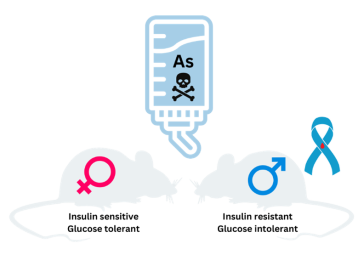Study finds humanized female mice may be "protected" metabolically from arsenic exposure
Researchers find sex effects – male humanized mice more susceptible to arsenic-induced diabetes than females

Dr. Praveen Sethupathy

Jenna Todero, UNC SRP Trainee and lead author on this study
In the recent study Molecular and Metabolic Analysis of Arsenic-Exposed Humanized AS3MT Mice, published in Environmental Health Perspectives, Project 1 trainee Jenna Todero and researchers Dr. Christelle Douillet, Dr. Bev Koller, Dr. Praveen Sethupathy, Dr. Miroslav Stýblo, and others found that humanized male mice are more vulnerable to arsenic-induced diabetes than females. Understanding why female mice may be more “protected” from arsenic effects on metabolism than males, could be an important stepping stone in research to help reduce future incidences of arsenic-induced diabetes.
The danger of arsenic
Millions of people worldwide consume drinking water with dangerous levels of arsenic. Negative associations between arsenic consumption and metabolic function are well known. In 2021, more than 36 million people in the US had type 2 diabetes and diabetes was the eighth leading cause of death, costing the US $412.9 billion in medical and indirect costs in 2022. Gaining a better understanding of the process by which arsenic affects metabolic function may help reduce future incidences of type 2 diabetes.
“Arsenic is a ubiquitous toxin in the environment,” said lead author Todero. “Even at a low dose it can alter the molecular landscape of cells and tissues and prime the body for metabolic disease.”
The process of how inorganic arsenic consumption affects metabolic diseases, like type 2 diabetes, is unclear. Additionally, the effect of arsenic exposure on type 2 diabetes in males versus females has not been well studied.
Researchers find arsenic-metabolism sex-effect

Researchers found that in humanized mice exposed to inorganic arsenic, male mice were more likely than female mice to develop indicators of diabetes, including insulin resistance and glucose intolerance.
Researchers used mice genetically altered to metabolize arsenic similarly to humans (aka “humanized” mice) to study the differences in effects of inorganic arsenic consumption on metabolic function in males and females. After one month of exposure to drinking water with high levels of arsenic, researchers measured arsenic levels in the liver and other tissues, along with changes to their genetic health and indicators of diabetes. Researchers also measured arsenic metabolites, which can be more toxic than arsenic itself.
Researchers found that humanized mice metabolize inorganic arsenic more slowly than wild-type (normal) mice. This is consistent with slow human metabolism of inorganic arsenic. The As3mt enzyme is linked to arsenic metabolism in both humans and mice, but humans metabolize arsenic less efficiently than mice. This indicates that the “humanized” mice are more effective at simulating what happens when people consume arsenic than wild-type mice whose differing genetics mean that they process arsenic more quickly. The slow metabolism of arsenic in humanized mice led to more arsenic and arsenic metabolites absorption into tissues, which led to more changes in cell function.
Todero was surprised to find a difference in metabolic health between male and female humanized mice, but not wild-type mice. Humanized male mice exposed to arsenic were more susceptible to metabolic dysfunction than humanized female mice. This finding motivates an important question about whether there are similar sex difference in humans, which has not yet been carefully investigated.
Molecular drivers and hope for the future
Researchers identified Klf11 as a potential master regulator of the sex divergence in humanized mice. This discovery may provide a target for future treatments aimed at addressing arsenic-induced diabetes. Klf11 is well known to play a regulatory role in metabolism. Todero thinks it is possible that when Klf11 is suppressed in males compared to females, the energy sources or fuels that various organs use could change. For example, the liver normally uses glucose to fuel its processes, but with the change in Klf11 it may start to use fat instead, leading to risk of the development of fatty liver disease. Todero would like to see future research explore these possibilities further.
Researchers also found that the microRNA gene miR-34a was uniquely elevated in males exposed to arsenic. This is notable because miR-34a is a well-established marker of insulin resistance and diabetes related phenotypes.
Todero noted that the mouse strain used in this study (129S) are particularly resistant to developing metabolic dysfunction. She is now looking at similar sex differences in another strain of mice (C57BL/6) that is more prone to metabolic disease. She mentions that collaboration with researchers in UNC SRP Project 2, Dr. Pardo Manuel de Villenia and Dr. Stýblo, has made access to both strains of mice possible.
Todero wants to know what makes the difference between sexes so strong and if female hormones, such as estrogen, may be protecting females against arsenic-induced metabolic problems. She hopes that future research will be able to answer some of these questions. She’s also expanding the organs of interest and investigating the effects of arsenic on brown adipose tissue and thermogenesis.
An invited perspective on this study was published in the same issue of Environmental Health Perspectives. Although this response highlighted some of the limitations of this study, it emphasized the usefulness of this humanized mouse model to make studies of arsenic exposure in mice more relevant to arsenic-induced diseases in humans. This is promising for future research aimed at understanding the effects of arsenic consumption on human health and metabolism.
